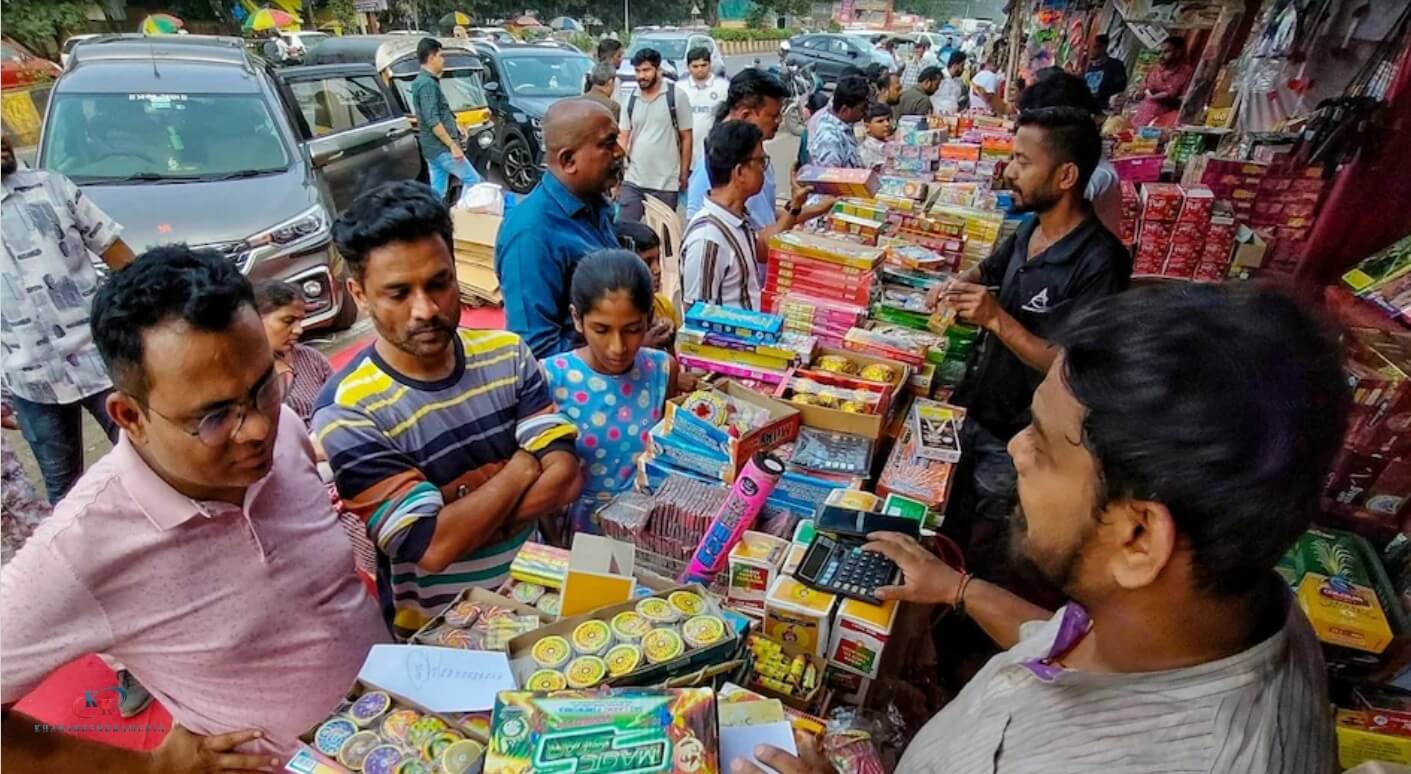
Special Correspondent
New Delhi, October 21, 2025. India’s festive fervor lit up more than homes this Diwali—it ignited an economic powerhouse. In a resounding endorsement of the ‘Vocal for Local’ mantra, Diwali 2025 sales soared to a historic ₹6.05 lakh crore, marking a 25% jump from last year’s ₹4.25 lakh crore, according to the latest research report from the Confederation of All India Traders (CAIT). Of this, ₹5.40 lakh crore came from goods, while services raked in ₹65,000 crore, underscoring the festival’s ripple effect across retail, logistics, and beyond. The surge not only highlights consumer resilience but also a decisive shift away from imports, with 87% of buyers—nearly 9 out of 10—choosing Indian-made products, leading to a sharp drop in demand for Chinese goods.
The CAIT Research & Trade Development Society’s comprehensive survey, spanning 60 major distribution hubs from metros like Delhi and Mumbai to Tier-2 and Tier-3 cities, paints a vivid picture of this triumph. Conducted between Navratri (September 29) and Diwali (October 20), it reveals how non-corporate and traditional markets—India’s 9 crore small traders—powered 85% of the total trade. “This Diwali stands as a benchmark for our retail economy, fusing tradition, technology, and trust,” said CAIT National President B.C. Bharat ia, emphasizing the role of small businesses in driving this growth.
A Swadeshi Revolution: 87% Preference for Made-in-India
The report’s standout revelation? A massive pivot to domestic products. Influenced by Prime Minister Narendra Modi’s ‘Swadeshi Diwali’ and ‘Vocal for Local’ campaigns, 87% of consumers shunned foreign imports in favor of homegrown alternatives, resulting in a 25% sales spike for Indian-manufactured items. Delhi MP and CAIT Secretary General Praveen Khandelwal hailed Modi as a “strong brand ambassador” for GST rationalization, crediting it with boosting trader and consumer confidence. “The decline in Chinese product demand is a direct outcome of this public sentiment,” Khandelwal noted, adding that 72% of surveyed traders linked the uptick to lower GST on everyday essentials.
This shift wasn’t just urban—rural and semi-urban areas contributed 28% of sales, signaling broader economic inclusion. The Trader Confidence Index (TCI) climbed to 8.6 from 7.8 last year, while the Consumer Confidence Index (CCI) rose to 8.4, fueled by stable prices and moderate inflation.
Sector-Wise Sales Breakdown: Where the Rupees Flowed
Diwali’s bounty was spread across diverse categories, with everyday essentials leading the charge. Here’s a snapshot of the top performers from the CAIT report:
| Category | Sales Share (%) | Estimated Value (₹ Lakh Crore) |
|---|---|---|
| Grocery & FMCG | 12 | 0.65 |
| Gold & Jewellery | 10 | 0.54 |
| Electronics & Electricals | 8 | 0.43 |
| Consumer Durables | 7 | 0.38 |
| Ready-Made Garments | 7 | 0.38 |
| Gifts | 7 | 0.38 |
| Home Decor | 5 | 0.27 |
| Furnishings & Furniture | 5 | 0.27 |
| Sweets & Snacks | 5 | 0.27 |
| Fabrics & Textiles | 4 | 0.22 |
| Puja Items | 3 | 0.16 |
| Fruits & Dry Fruits | 3 | 0.16 |
| Bakery & Confectionery | 3 | 0.16 |
| Footwear | 2 | 0.11 |
| Others | 19 | 1.03 |
Jewellery shone brightest, with Dhanteras alone clocking ₹85,000 crore over two days; total turnover through Diwali and Bhai Dooj is projected at ₹1-1.35 lakh crore. Electronics and durables followed, boosted by discounts and EMI options.
Services Sector Joins the Festive Feast
Beyond goods, services added ₹65,000 crore, spanning packaging, hospitality, cab rides, travel, event management, tent rentals, manpower, and last-mile delivery. This ecosystem not only amplified the goods trade but also created 50 lakh temporary jobs in logistics and retail support— a boon for seasonal workers amid economic recovery.
Broader Impact: Jobs, Confidence, and a Call for More
The festive boom reaffirms small traders as India’s growth engine, with CAIT urging policy tweaks: simpler GST compliance, easier credit for SMEs, and logistics hubs in smaller cities. “This isn’t just sales—it’s a story of self-reliance,” Bharat ia added. As Diwali’s glow fades, the real spark is the sustained momentum for ‘Aatmanirbhar Bharat,’ with experts eyeing spillover into year-end spending.
This Diwali wasn’t just about lights and sweets; it was a ₹6.05 lakh crore testament to India’s entrepreneurial spirit. What’s your festive buy that screamed ‘Made in India’? Share in the comments!







